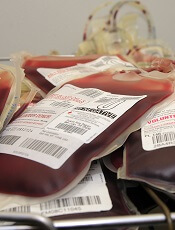
Credit: UAB Hospital
Three organizations have joined together to adapt a pathogen inactivation system so that it works in whole blood and can be used in sub-Saharan Africa.
The INTERCEPT Blood System is currently used to inactivate bacteria, viruses, parasites, and leukocytes in donated platelets and plasma.
However, as the common practice in many African countries is to transfuse whole blood, the organizations want to adapt the system so it can be used with whole blood.
They also want to ensure the system can function in regions that may not have the infrastructure to support complex devices or have access to controlled temperature storage. Ideally, the system will not require electricity to inactivate pathogens or leukocytes.
For this endeavor, the company that makes the INTERCEPT system, Cerus Corporation, has partnered with SRTS Geneva and Swiss Transfusion SRC.
The Humanitarian Foundation Swiss Red Cross has granted funds to Swiss Transfusion SRC for the project. The initial funding of 1.5 million Swiss Francs will support the feasibility phase of the project and the completion of in vitro studies to support clinical trials.
“We believe pathogen inactivation for whole blood has the potential to improve the safety of transfusions in sub-Saharan Africa, where diminished blood availability due to severe anemia from malaria, HIV, and obstetric bleeding is common,” said Rudolf Schwabe, chief executive officer of the Swiss Red Cross.
“Based on our experience over the past 3 years with the INTERCEPT system, we have seen first-hand the substantial impact that pathogen inactivation has had in reducing transfusion-transmitted infectious risk in platelets and plasma.”
“This technology should be made available to developing countries such as those in sub-Saharan Africa, where the risk of bacterial contamination is about 2500 times greater than in Switzerland, and 10% to 15% of HIV infections are caused by contaminated transfusions.”
Cerus currently sells the INTERCEPT Blood System for both platelets and plasma in Europe, the Commonwealth of Independent States, the Middle East, and select countries in other regions around the world.
In the US, Cerus is seeking regulatory approval of the INTERCEPT Blood System for plasma and platelets.
The INTERCEPT red blood cell system is in clinical development. For more information, see the Cerus website.

